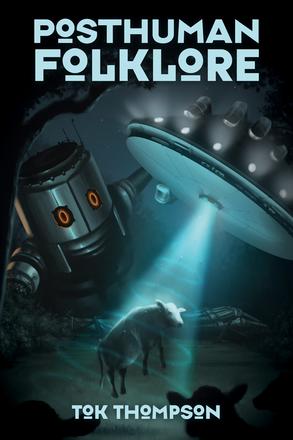
The first book-length study of how animal studies and digital culture change what it means to be “us”
Description
Can a monkey own a selfie? Can a chimp use habeas corpus to sue for freedom? Can androids be citizens? Increasingly, such difficult questions have moved from the realm of science fiction into the realm of everyday life, and scholars and laypeople alike are struggling to find ways to grasp new notions of personhood.
Posthuman Folklore is the first work of its kind: both an overview of posthumanism as it applies to folklore studies and an investigation of “vernacular posthumanisms”—the ways in which people are increasingly performing the posthuman. Posthumanism calls for a close investigation of what is meant by the term “human” and a rethinking of this, our most basic ontological category. What, exactly, is human? What, exactly, am I?
There are two main threads of posthumanism: the first dealing with the increasingly slippery slope between “human” and “animal,” and the second dealing with artificial intelligences and the growing cyborg quality of human culture. This work deals with both these threads, seeking to understand the cultural roles of this shifting notion of “human” by centering its investigation into the performances of everyday life.
From funerals for AIBOs, to furries, to ghost stories told by Alexa, people are increasingly engaging with the posthuman in myriad everyday practices, setting the stage for a wholesale rethinking of our humanity. In Posthuman Folklore, author Tok Thompson traces both the philosophies behind these shifts, and the ways in which people increasingly are enacting such ideas to better understand the posthuman experience of contemporary life.
Reviews
"Posthuman Folklore is the first work of its kind: both an overview of posthumanism as it applies to folklore studies and an investigation of “vernacular posthumanisms”—the ways in which people are increasingly performing the posthuman. "
- Alexandra Sanchez, AFS Review
"Tok Thompson’s Posthuman Folklore is a wonderfully provocative collection of essays that, as a whole, asks us to reposition our thinking about the underlying assumptions of what it means to be human and, by extension, the dynamics of folklore. "
- Timothy R. Tangherlini, University of California, Los Angeles, Journal of Folklore Research
"There is a lot of value in Posthuman Folklore, both as an overview of the current state of affairs in animal studies and folklore, as well as a potential roadmap for future research in those fields. . . . Better engagement with folkloric traditions and approaches (particular non-Western traditions) allow for the more flexible thinking required for this historic moment, and Thompson presents an entry point to a conversation that will continue beyond the foreseeable future. "
- Peter Cullen Bryan, SFRA Review
"Tok Thompson’s important contribution to folklore theory could be seen as an optimistic project we would all like to join as folklorists, researchers, and human-like animals. "
- Taija Kaarlenkaski, Jyrki Pöysä, and Tiina Seppä, Ethnologia Fennica
"In Posthuman Folklore, Thompson pushes on questions at the boundaries that we have long drawn to define humanity, and in doing so, he creates liminal spaces in which to imagine or to reimagine animals as persons; humans as animals; and artificial intelligence as personlike yet untethered to bodies, much less tethered to geographical locations or temporal periods. The great strength of this book, and its fresh and innovative contribution to the field, is its illumination of these liminal zones from which we can reconsider some of our most fundamental questions. "
- Anne Benvenuti, Journal of American Folklore
"The book is a must-read for anyone focused on the live performance of story, text, or culture. The publication of this text marks an important first volley in folkloric posthumanism, one that is certain to seed future research projects with useful (re)conceptualizations of key terms in light of a posthumanist position."
- Travis Brisini, Storytelling, Sefl, Society